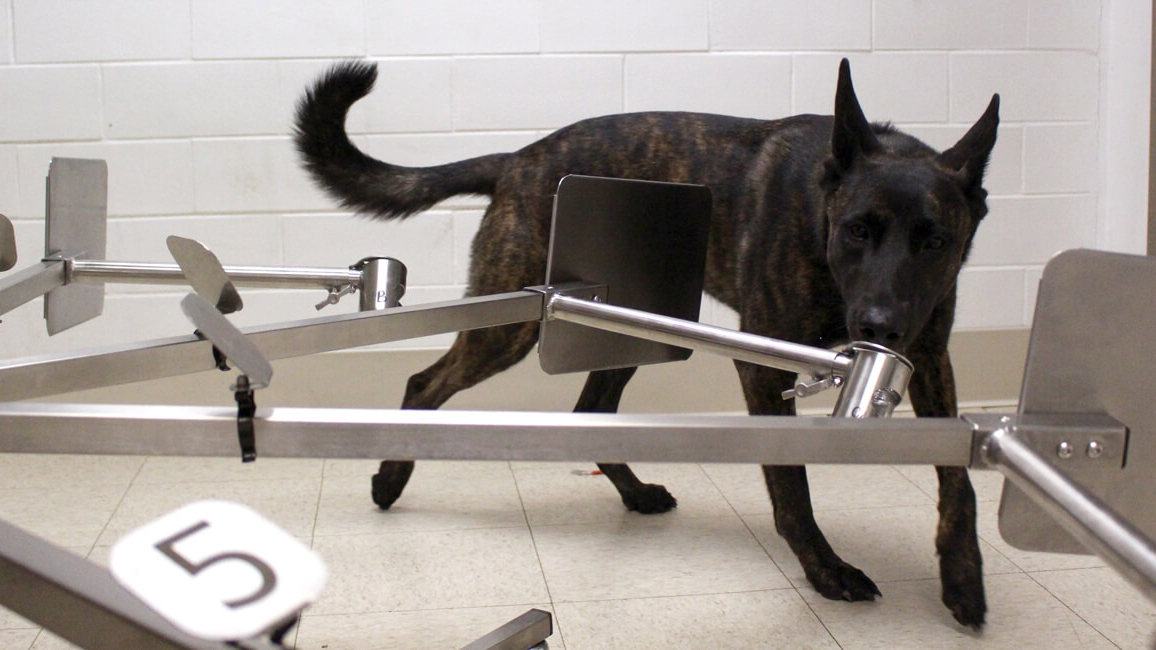Dogs are being trained to sniff out COVID-19 in humans
Researchers are putting canine scent receptors to the test

Scientists are training dogs to identify COVID-19 by following their noses.
A new program at the University of Pennsylvania's School of Veterinary Medicine (Penn Vet) is putting noses to the grindstone for disease detection. Researchers are working with dogs to see if the canines' superior sniffers can help with early detection of COVID-19 in humans.
Dogs that can pinpoint the scent of COVID-19 could identify infection in people who are asymptomatic, and could play a valuable role in disease response as people return to work and social-distancing restrictions are relaxed, Penn Vet representatives said in a statement.
Related: Coronavirus outbreak: Live updates
Reports of dogs sniffing out cancer have been documented since the 1980s, Live Science previously reported. Many cells produce volatile organic compounds (VOCs) that have distinctive odors and are present "in human blood, saliva, urine or breath," Cynthia Otto, a doctor of veterinary medicine and a director of Penn Vet's Working Dog Center, said in the statement.
Studies have shown that the smell of VOCs released by cancerous cells is unique enough that dogs' sensitive noses — which have up to 300 million scent detectors, compared with around 6 million in people — can spot the presence of cancer cells amid healthy ones; in fact, most dogs can be trained in about six months to identify the smell of a specific cancer. That same ability could enable dogs to identify disease caused by the novel coronavirus.
In the Penn Vet program, eight dogs will initially be trained in a laboratory setting. Over three weeks, they will first learn to recognize the smell of COVID-19 in saliva and urine samples from infected patients, through a technique known as odor imprinting, according to another Penn Vet statement. The dogs will then be tasked with differentiating between those samples and samples collected from people who do not have the disease.
Sign up for the Live Science daily newsletter now
Get the world’s most fascinating discoveries delivered straight to your inbox.
"The potential impact of these dogs and their capacity to detect COVID-19 could be substantial," Otto said. "This study will harness the dog's extraordinary ability to support the nation's COVID-19 surveillance systems, with the goal of reducing community spread."
But could exposure to COVID-19 pose a threat to the dogs? In March, a pet dog in Hong Kong tested positive for COVID-19, and experts suspected that it had caught the disease from its infected owner, Live Science reported. This is thought to be the first example of human-to-animal transmission of COVID-19.
However, some experts were doubtful about the dog's diagnosis. Initially, the animal did not receive a blood test that would have confirmed the presence of coronavirus antibodies created to fight off the infection, and a blood test that was performed later did not find any coronavirus antibodies, Live Science reported.
Then again, it's possible that the dog experienced a mild immune response to COVID-19 that did not require the production of specific antibodies. Another dog, a pug in North Carolina, also tested positive for COVID-19 after likely catching it from its owners, Time reported on April 28.
Trained dogs could be ready to start sniffing out COVID-19 in humans by July, according to the Penn Vet statement.
- The 12 deadliest viruses on Earth
- Going viral: 6 new findings about viruses
- Top 10 mysterious diseases
Originally published on Live Science.
OFFER: Save 45% on 'How It Works' 'All About Space' and 'All About History'!
For a limited time, you can take out a digital subscription to any of our best-selling science magazines for just $2.38 per month, or 45% off the standard price for the first three months.

Mindy Weisberger is an editor at Scholastic and a former Live Science channel editor and senior writer. She has reported on general science, covering climate change, paleontology, biology and space. Mindy studied film at Columbia University; prior to Live Science she produced, wrote and directed media for the American Museum of Natural History in New York City. Her videos about dinosaurs, astrophysics, biodiversity and evolution appear in museums and science centers worldwide, earning awards such as the CINE Golden Eagle and the Communicator Award of Excellence. Her writing has also appeared in Scientific American, The Washington Post and How It Works Magazine. Her book "Rise of the Zombie Bugs: The Surprising Science of Parasitic Mind Control" will be published in spring 2025 by Johns Hopkins University Press.











